Fire in her belly
Sharon Winsor is on a mission to change the native food industry.
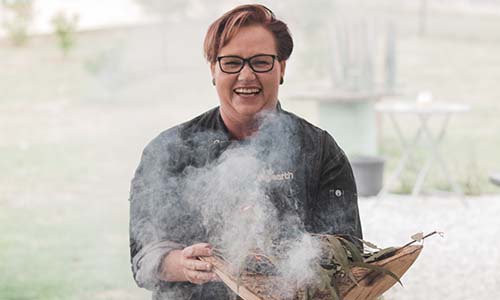
You may have heard of Sharon Winsor (Adv. Dip. Community Management, 2004). Founder, CEO and executive chef of award-winning Mudgee business Indigiearth, her sought-after dining experiences, cultural immersions and native food products are built on culture and purpose. What you probably don’t know, however, is that as part of the burgeoning native food industry, her business is just one of only 1.5% of businesses that are Aboriginal-owned. But Ms Winsor is working to change that. And this is why we should all get behind her.
Having spoken with Sharon Winsor, a proud Ngemba Weilwan woman from Gunnedah and Rocky Glen near Coonabarabran, I could tell you about how she lived on Country as a child, collecting native bush foods and botanicals. How she used to sweep the dirt floor, and thought everyone lived the way she did. "I had the best childhood," says Ms Winsor.
"Growing up, we knew when bush fruits were coming into season. We knew when certain specimens or medicines would come out. We’d go walking for a whole day collecting fruits. We’d catch yabbies and take the sap off the trees that were good medicine for toothaches – that’s what we grew up with."
I could tell you how she loved horses and how her dad, a white man, a battler from the bush, convinced her to move into town with the promise of a horse and riding lessons. I could tell you how she returned from a riding competition in New Zealand to find her mum had left. "No sign, no warning, she just up and left," says Ms Winsor in her measured way.
I could tell you how afterwards, ‘in a bit of a spin,’ Ms Winsor moved to Sydney and studied nursing at Sydney Uni because many of her relatives worked in health or as a nurse. But after a year, she decided it wasn’t for her and worked for the Wesley Mission as their Aboriginal outreach worker instead.
She married and started a business, but was missing Country. ‘When I spoke about native foods and my childhood, people had no idea what I was talking about, so my husband and I started a business with a traditional dance group, and I performed and did bush food catering.
"That was 28 years ago now. I had a fire in my belly about creating a native food business, and that’s why I started my course at Macquarie University. The subjects weren’t just about working in Community – we did marketing and accounting, and other subjects that helped me establish my business."
"I loved everything about it – the people, the other students, the staff, and how seamlessly the course structure worked in with my life. We’d do uni on campus for two weeks at a time and the rest was done by distance. Like many other regional people, it appealed to me because I didn’t have to leave my home or Community."
But the road following her graduation wasn’t always smooth. "In my first year of business, I lost my first baby. I went full term with him and he was stillborn. His name is Ngukirri, which means ‘to give’ in our language. Again, life put me in a spin and I didn’t do business for a while; I couldn’t function."
"And then, with the support of family and friends, I picked it up again. I started to feel better and realised it wasn’t because I was running a commercial business – it was because I was doing culture through business. That was the start of a very long healing process."
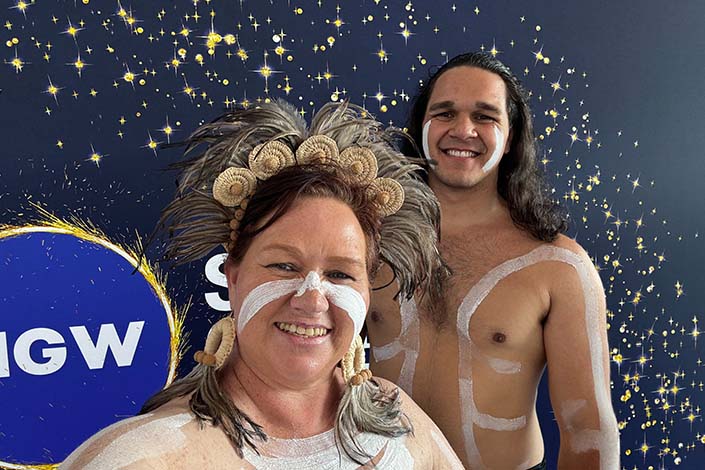 "I went on to have two more children. My daughter Kirralaa, who’s 25 – her name means star in our language. And my son Maliyan, who’s 23. His name means wedge-tailed eagle. And I continued with my business, doing some pretty amazing things, like performing for Oprah when she came to Sydney, and I took Tyra Banks and America’s Next Top Models out bush and did culture and photo shoots with them."
"I went on to have two more children. My daughter Kirralaa, who’s 25 – her name means star in our language. And my son Maliyan, who’s 23. His name means wedge-tailed eagle. And I continued with my business, doing some pretty amazing things, like performing for Oprah when she came to Sydney, and I took Tyra Banks and America’s Next Top Models out bush and did culture and photo shoots with them."
"Then, 15 years ago, I suffered severe domestic violence. After this third major knock in my life, I just couldn’t get better. I hit rock bottom mentally, emotionally, financially, spiritually. I was in survival mode, hiding mode. I realised I’d lost myself and wanted to figure out what made me happy – and again, it was the memories of my childhood in the bush. I knew I had to get back to Country, so moved to Mudgee pretty much overnight."
Ms Winsor had often travelled through the area to visit family in Gilgandra and Gulargambone, where the Aboriginal side of her family is from. ‘I always liked Mudgee,’ she says. "There’s something about the mountains and the connection to Country – the spirits, which are still very much alive in those mountains, just give me an inner peace."
And that’s when Ms Winsor decided to refocus the business, rebranding as Indigiearth. "I had a vision of launching my own retail brand, so that’s what I did. And I’ve been working ever since with communities across the country, sourcing my ingredients from Aboriginal growers, owners and producers."
"And so, my journey continues," she reflects, with that quiet determination born of her dad’s insistence on never giving up, and the resilience on her mum’s side. "I’ve been rebuilding myself, the business, the brand, developing products. I’ve had a cafe for a couple of years, I have a dining experience. Plus, there’s the retail side."
"But what I’m doing in the native food space and botanicals is far greater than this. More than a food source, these bush foods connect us to Country, they connect us to our creator, they connect us to our spirituality, our culture, our identity – they connect us to who we are."
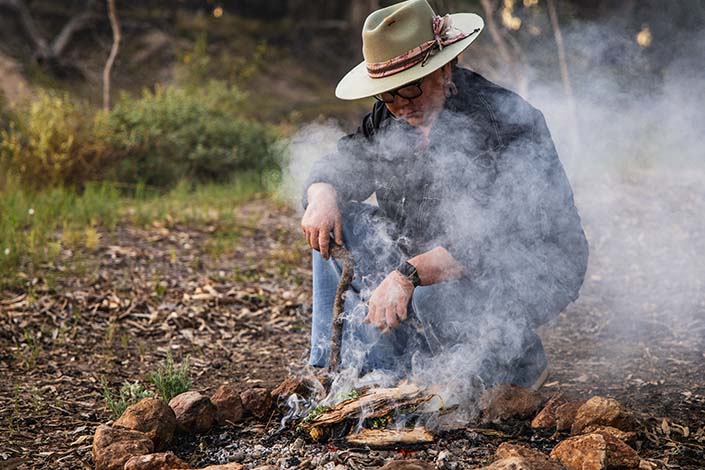 "And when I go out west, I take local kids out in the bush with me and teach them too – we’re speaking language, we’re enabling the development of our young kids, and we’re showing them that business is possible no matter where they are."
"And when I go out west, I take local kids out in the bush with me and teach them too – we’re speaking language, we’re enabling the development of our young kids, and we’re showing them that business is possible no matter where they are."
"We’re showing them what it means to be in business and how to build their independence," by which she also means financial security. "Aboriginal people don’t have any generational wealth to rely on," she explains. "It’s only now, in my generation, that I can create something for my kids. And that’s from my business."
An undeniably important role model, Ms Winsor has been recognised for her achievements. "I was the first Aboriginal person to win the NSW Business Leader of the Year and, among other awards, last year I won Delicious. magazine’s Native Food Producer of the Year and was the overall winner of the 2023 Shine Awards."
This year, Ms Winsor says she’s been carving out time for what she really enjoys. "Things that have purpose and meaning, and are nourishing for me as well. I just did a two-day immersion on Country with the founder of Oz Harvest Ronnie Kahn and her executive team, sharing food and exploring a deeper understanding of culture."
And, of course, close to her heart is being active in the native food industry. She’s the Director of the First Nations Bushfood and Botanicals Alliance – the only First Nations-owned and led peak body dedicated to protecting the integrity and authenticity of sovereign foods and botanicals, igniting First Nations culture as an asset.
"We’re working toward a standard we can use for native foods and botanicals to guarantee the integrity of the product," explains Ms Winsor, who is also the Director of Black Duck Foods, an Aboriginal social enterprise committed to traditional food-growing processes that care for Country and return economic benefits directly to Community.
"I also do a lot of work with the NSW Indigenous Tourism Council," she adds. "I want to support the industry and Aboriginal-owned businesses as much as possible." And that’s why she’s also a founding member of Supply Nation, which helps corporate Australia do business with Aboriginal people across a range of industries, from construction to the digital world.
"We started out as a dozen or so Aboriginal businesses, certified suppliers, and over the last 15 years we’ve grown to include over 4,000 Aboriginal businesses. We’re creating connections and helping corporates understand the importance of supporting Aboriginal people through business. It’s about opportunities – a hand-up, not a hand-out," she emphasises.
"So, that’s been my life. Being a single mum, raising kids and growing a business hasn’t been easy, and it’s been entirely self-funded. There were many times when I had to decide between paying the rent or doing a job and waiting for the money to come in," she remembers, saying she never thought the business would get as big as it has.
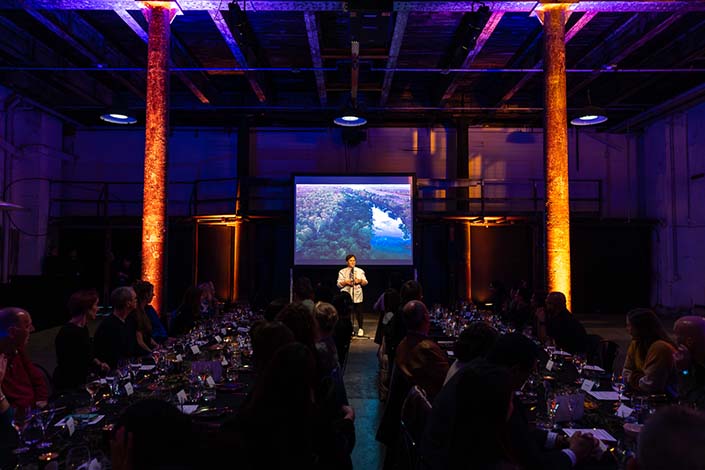 "I never intended to win awards; I never thought Indigiearth would be as successful as it is. And it’s been amazing, but for me, the business serves a much bigger purpose – it’s my connection to my culture, and it has pulled me out of some pretty dark places in my life. The fire in my belly has never gone out, and being in business and doing culture will forever be my healing."
"I never intended to win awards; I never thought Indigiearth would be as successful as it is. And it’s been amazing, but for me, the business serves a much bigger purpose – it’s my connection to my culture, and it has pulled me out of some pretty dark places in my life. The fire in my belly has never gone out, and being in business and doing culture will forever be my healing."
In fact, if anything, the fire in her belly just gets stronger, especially with the rise in the interest in native foods and the industry generally. "It’s been quite overwhelming at times," she acknowledges, saying the growth has brought with it opportunities but there’s an ugly underbelly to the good news stories too.
"The industry is now worth hundreds of millions of dollars every year, but Aboriginal ownership of these native foods businesses is only 1.5%," explains Ms Winsor. "This means other people are using our traditional knowledge and intellectual property to promote their products – our culture, our knowledge, is being taken advantage of, and nothing is being given back; there’s no acknowledgement. It’s not ok."
"I’m not saying non-Aboriginal people shouldn’t be in the native food space. Rather, we want people to pay respect to where that knowledge comes from, acknowledge our people, and engage with our communities and have good relationships with them."
As she explains, "There have been lots of non-Aboriginal farmers and growers who’ve planted thousands of acres of ingredients for their own financial gain. A few fruits, like the finger lime, are a massive export market, and they’re all non-Aboriginal owned. Again, they’re using our cultural IP and knowledge to sell and promote their products – and make a profit."
"And then, there are the big companies that take advantage of Aboriginal growers, going out to communities and purchasing a tonne of bush tomatoes and dictating the price – saying they’re only going to pay $10 or $20 a kilo, then selling them in the cities for $800 a kilo."
Some companies are even growing native ingredients overseas to supply the booming export market or bring back into the country. ‘They run out of land,’ explains Ms Winsor, "so they go to Southeast Asia and grow lemon myrtle, for example."
Not one to sit idly by, Ms Winsor has been working directly with ministers and departments advocating for change, including the Department of Agriculture, and advising key officials, such as the ambassador for First Nations Trade. "One of the problems is that native ingredients are not classified as a food source under the Australian export list of approved products – they’re still listed as flora and fauna, which prevents many of our ingredients from being exported."
"When this legislation is changed, we’ll be able to export ourselves, and the market won’t rely on non-Aboriginal people growing it overseas,’ she says. ‘Still, it’s only been this year that people like me have been invited to have this discussion," continues Ms Winsor, who earlier in the year was a guest speaker at the 50th anniversary of the ASEAN trade agreement.
"We’re now at roundtable discussions with the Department of Agriculture, Fisheries and Forestry on these issues," she says. "It’s a work in progress, but we need to create legislative change and more awareness of what’s happening in the native food space, both here and internationally."
"And we need to be involved in the export industry, we need to educate people," she says. "There’s huge interest in the native food space worldwide, but people aren’t getting the correct cultural information. It has come from non-Aboriginal people, and that’s not ok. We need to be authors of our own stories, and we need to be there to share our stories."
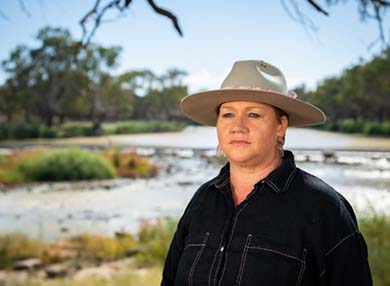 To this end, Ms Winsor has been visiting Singapore for the last few years. And she has just returned from Saudi Arabia, where she was a guest speaker at both the Agricultural and Traceability Symposium and the Saudi Women’s Business Breakfast networking event, as well as sharing native foods and flavours at an Australian Embassy networking event and the Saudi Food Expo.
To this end, Ms Winsor has been visiting Singapore for the last few years. And she has just returned from Saudi Arabia, where she was a guest speaker at both the Agricultural and Traceability Symposium and the Saudi Women’s Business Breakfast networking event, as well as sharing native foods and flavours at an Australian Embassy networking event and the Saudi Food Expo.
"My involvement in the industry is about bringing awareness to the wider public about supporting Aboriginal businesses in general, and Aboriginal women in particular," she says. "Bush food is traditionally women’s business. It’s the women and young girls who are out collecting bush food and medicine, practising traditional methods, and we need to help those communities, those women, those businesses, and support their growth and development," she urges.
"When people deal directly with Aboriginal people and growers, it has such a positive ripple effect on the business and Community, and our whole race of people because we do business in a totally different way to the rest of the world. We, Aboriginal people, are also 90% more likely to employ other Aboriginal people, which is especially important because Aboriginal women are 95% more likely to be carers than anyone else in the country."
As an example, she notes, "I’m a carer to my disabled brother, and I’ve also supported another brother financially for years. He’s Australia’s first Indigenous Winter Olympian, but because there was limited support in Australia or elsewhere, I funded him."
Aboriginal women everywhere are the linchpins of their communities. "As Aboriginal women in business, we can and do support the wider Aboriginal community," continues Ms Winsor. "But it’s not just about me and my business, or other women like me. It’s about the rise of all our people – I want to be a part of the rise of all our people."
And, after listening to Ms Winsor, that’s what I really want to tell you. Because, as she explains, "It will take another seven generations before we’re at the same standard as non-Aboriginal people in business, in life, in Community, because of generational trauma and the poverty we’ve inherited."
It takes a while for that to sink in. But that, right there, is what you can be part of changing when you support an Aboriginal business. When you check where your native food ingredients come from, when you check if it’s an Aboriginal-owned business. When you go straight to the source – as a customer or a journo – and hear the stories directly from Aboriginal people, and support their businesses, whatever they may be.
May we all be part of that. And may the fire in Ms Winsor’s belly never go out, until that is done.
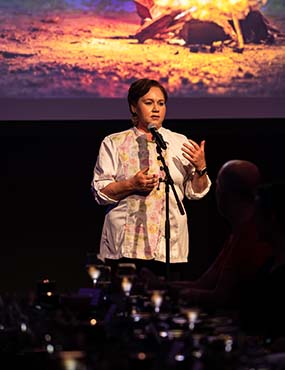
A proud Ngemba Weilwan woman living and working on Wiradjuri Country, Sharon Winsor graduated from Macquarie University in 2004 with an Advanced Diploma in Community Management, receiving the academic of the year award.
With almost 30 years of experience in the food industry, as founder, CEO and executive chef of Indigiearth – award-winning innovators and leading suppliers of modern Australian native food, botanicals and products – Ms Winsor is passionate about connecting people with Aboriginal culture and heritage through native foods and botanicals, and traditional dance.
The Director of the First Nations Bushfood and Botanicals Alliance Australia and Black Duck Foods, Ms Winsor has recently been instrumental in establishing Supply Nation , Australia’s leading database of verified Indigenous businesses.
In memory of her first son, she has also established the Ngukirri Foundation,, giving back to Community and supporting Aboriginal women and families who’ve lost children through stillbirth. Aboriginal women are 50% more likely than non-Aboriginal women to have stillborn children, and the foundation is dedicated to helping and supporting these women.